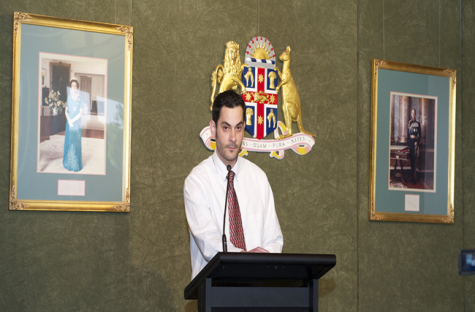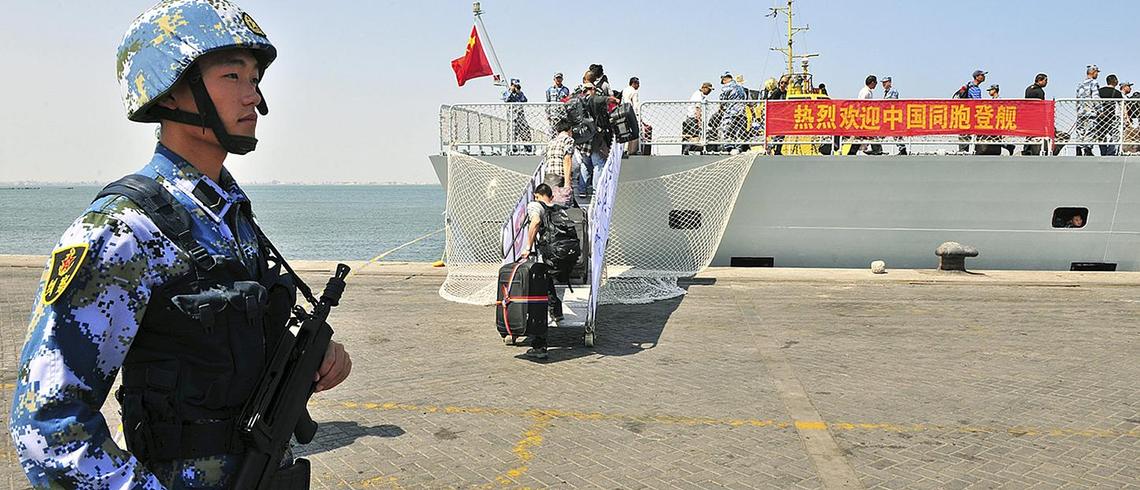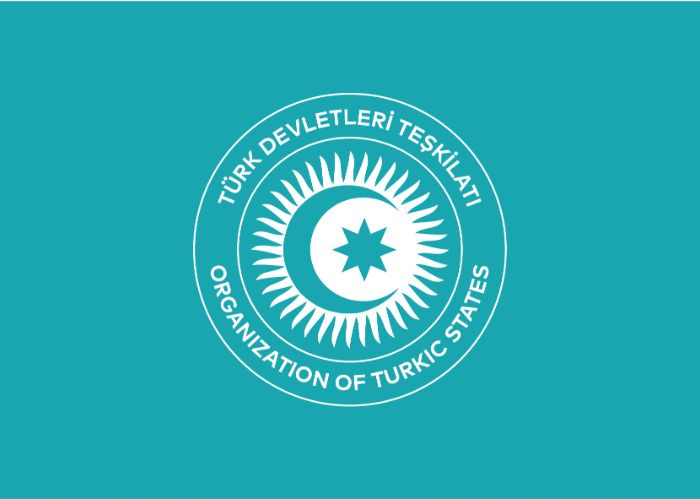AVİM
07.07.2015
Tal Buenos is a PhD Candidate in Political Science at the University of Utah. His research interests include American Foreign Policy, British Imperialism, International Relations Theory and Turkish-Armenian Relations. Much of his recent research focuses on the place of the genocide discourse in international politics. Within this framework, Mr. Buenos studies extensively the ‘politics of genocide accusations against Turkey’, in other words, political motivations behind the genocide hypothesis.
According to Tal Buenos, genocide accusations against Turkey are essentially a soft-power instrument against Turkey and it is indeed not the Armenians, but the Americans that devised genocide accusations as a leverage against Turkey during the 1970s.
Below is the op-ed of Tal Buenos on Vakahn Dadrian, one of the pioneers of the ‘Armenian genocide’ literature, based on a recently found CIA document. This op-ed was originally published at Daily Sabah on 6 July 2015 (http://www.dailysabah.com/op-ed/2015/07/06/dadrian-an-armenian-name-in-an-american-game).
Dadrian: An Armenian name in an American game
Tal Buenos
Dadrian-case has once again demonstrated how we are hypnotized by Western-narrated stories which have great imperialistic plans mischievously affecting everyone
Vahakn N. Dadrian is often described by genocide scholars as the distinguished pioneer in their field of study. The high regard for this founding father of genocide scholarship is ingrained in the discourse on genocide as part of a premeditated field-enhancing rhetoric that seeks to sustain the legitimacy of its product. This is how a biased academic field of study strives to lend itself credibility: It talks about its early days in a romanticized manner, but without commitment to fact-based inquiry.
However, the conduct of research that is free of such information control might show that the circumstances surrounding the initiation of Dadrian's work warrant a question that has not been asked, let alone answered, about the trusted originator of the field of genocide study. A recently found CIA document regarding Dadrian serves as a significant indication that genocide scholarship cannot be evaluated without consideration of its origin.
In the 1950s it became apparent that the greatest challenge to American control over world opinion was the accusation of neocolonialism by a collective of smaller countries in Africa and Asia. These countries maintained that the U.S. was using its power to coerce, bribe or co-opt local elites to run their countries according to U.S. interests, leading to an exploitation of local resources and an expropriation of national culture. It was then that an interest emerged in the U.S. to establish American-controlled narratives of the national histories of small nations, such as Armenians. At Harvard University, a group led by Richard N. Frye, a professor of Iranian and Central Asian studies who had a substantial background in intelligence work for the U.S. government, attracted the cooperation of the Armenian elite in Massachusetts in a bid to entrust the university with the power to narrate Armenian history. Thus, the claims of neocolonialism against the U.S. were effectively offset by the ability of American academia to create narratives of small nations in which local regimes were shown as villainous and responsible for local suffering. The popularization of these national narratives had the impact of a diversionary tactic. In this context, Armenian scholars were molded and promoted in order to give the Armenian narrative in U.S. universities a sense of authenticity. Dadrian was one of these scholars.
In the 1960s, the unprecedented bombing of Vietnam brought with it worldwide accusations of genocide against the U.S. This meant that it would no longer suffice to control the narratives on the histories of small nations to negate the vocalized perspectives on American neocolonial abuse. American aggression in Indochina went far beyond neocolonialism, and there was a growing American need to control the use of the term genocide. While Richard G. Hovannisian was destined to be the rising star in the American-controlled version of modern Armenian history, Dadrian was bestowed with opportunities to publish sociology-inspired articles that would reinvent the meaning of genocide in a manner that serves U.S. interests.
In the 1970s Dadrian produced writings in which there is a clear assumption of authority on the term genocide. Despite the generally high methodological standards in the social sciences, Dadrian's characterization of the Armenian tragedy as genocide was based on a slanted presentation of unreliable sources. It is highly unusual for the academic community to accept and publish material in which a scholar makes certain claims about history that are based on an uncritical reading of wartime propaganda. Dadrian cites Arnold Toynbee as a credible source, although Toynbee was hired by the British government for the very purpose of producing anti-Ottoman propaganda during the war. Dadrian also cites political figures and missionaries whose clear interest was to rally the public against the Ottoman Empire. It is hard to imagine how such disingenuous work could be approved by editorial boards of academic journals unless Dadrian was empowered by movers and shakers. Instead of his work being rejected, Dadrian's failure to meet research criteria is actually repeated and solidified by others: Leo Kuper legitimized Dadrian's work, Samantha Power legitimized Kuper's work, and many students of genocide currently cite Power without feeling the need to research any further. Taner Akçam's work builds directly on the work of Dadrian, his mentor. This is how the information on genocide stays controlled and the field of study thickens on a steady diet of unchecked falsehoods.Not only did Dadrian provide an Armenian building block for the American genocide narrative against Turkey as part of the effort to eliminate genocide accusations against the U.S. for its actions in Vietnam, he also argued in 1976 that what happened to Native Americans in the U.S. was not genocide, but merely a result of a conflict that was forced by "structural properties." In his article, "The Victimization of the American Indian," use is made of Dadrian's non-Anglo-Saxon Armenian identity to assume "an objective point of view" about the suffering of Native Americans and determine that their "victimization was neither uniform, nor constant, but that it was confined by a set of variables reducing its incidence, scope and severity." In other words, from his American-given position as an expert on genocide, Dadrian found that there was an "absence of a policy of total and ruthless extermination of the American Indian ..."
Why would a sociologist decide to write something of this nature unless in service of U.S. interests? Dadrian's style of excluding the cases of the Vietnamese and Native Americans from his accusations of genocide is in line with U.S. interests and has set the tone for genocide scholarship to this day.
Interestingly, Dadrian was marked as the "subject" of a confidential, now declassified, CIA communication, which is dated July 30, 1962. This means that Dadrian was a matter of investigation and interest for the U.S. government years prior to his emergence as an expert on genocide. The document was sent by the Chief of the Munich Operations Group who expressed concern about "considerable past suspicious activity on subject's part." The bottom-line question in the communication is: "Has Headquarters verified subject's background?" It might be speculated whether there was concern that the plan to promote Dadrian as a reputable scholar of Armenian-related studies through government-affiliated academic platforms could be hampered by his personal background, or perhaps the CIA was looking to hold on to Dadrian's past incidents in order to blackmail him into producing academic literature according to the dictation of U.S. interests. According to this document, Vagh Gulumian, who is described as the head of the Dashnak in Germany at the time, told a CIA source that Dadrian had been well received in the Soviet Union "as a communist sympathizer" but was later "expelled for rape." It was also said that Dadrian had "close relatives in U.S. congressional circles."
Having this in mind, it seems to be high time that upon his next interview Dadrian would take some time off his genocide-labeling tasks to answer the following question: To what extent did the U.S. government facilitate and influence his genocide-related work? The answer is foundational to the entirety of genocide scholarship, yet information control has sterilized the discourse from having a discussion on this matter. The public, especially Armenians who have been mobilized by Dadrian's publications, would be interested to know whether this scholar was an agent of American interests and whether his Armenian name was used to instigate genocide accusation against the Ottoman government.
Meanwhile, the American enterprise, the International Association of Genocide Scholars, is scheduled to have yet another one of its annual conferences. The conference will be held in Yerevan from July 8 to July 12. It is likely to center on the accusation of genocide against Ottomans and the accusation of denial against Turkey in keeping with the controlled discourse that has been carefully developed and disseminated since the Vietnam War. It is also likely that Dadrian will be regarded there as an eminent scholar whose work is seminal, while the conference participants maintain utter ignorance of the circumstances in which his work on genocide began. An adequate inquiry by genocide scholars might show that their perception of Dadrian is the product of a hollow structure. To them, however, such an inquiry is dreaded and avoided, for what they would find might necessitate a recognition that their academic work is an extension of American soft power; a continuation of a political agenda that is framed as scholarly.
To Armenians, such a recognition might lead to an identity crisis or transformation, for what they would find might mean that, much like in the 19th century, the Armenian people are being told who they are by a great power that is using its ability to instill a Western-narrated story of Armenian nationalism so as to make Armenians into pawns in a much greater imperialist game.
© 2009-2025 Center for Eurasian Studies (AVİM) All Rights Reserved
Henüz Yorum Yapılmamış.
-
THE DIFFERENCE BETWEEN GENOCIDE AND DENATIONALIZATION - DAILY SABAH
Tal BUENOS 18.02.2016 -
TAL BUENOS’ COMMENTARY ON THE BACKGROUND OF THE GENOCIDE HYPOTHESIS
Tal BUENOS 06.07.2015 -
AMAL AND THE ARMENIANS: THE POWER TO ATTRACT
Tal BUENOS 16.09.2015 -
REDDETME HAKKI
Tal BUENOS 25.04.2014 -
 TAL BUENOS TARAFINDAN NSW PARLAMENTOSU’NDA YAPILAN KONUŞMA
TAL BUENOS TARAFINDAN NSW PARLAMENTOSU’NDA YAPILAN KONUŞMA
Tal BUENOS 25.12.2014
-
 DOĞU AKDENİZ’DE ÇİN - 19.11.2021
DOĞU AKDENİZ’DE ÇİN - 19.11.2021
Deniz ÜNVER 19.11.2021 -
TÜRKİYE-AZERBAYCAN İLİŞKİLERİNDE PSİKOLOJİK FAKTÖR - Halit GÜLŞEN
- 24.03.2010 -
GALLIPOLI AND WHY TURKS ARE ANGRY
Jeremy SALT 22.11.2013 -
 THE SUMMIT OF EXPECTATIONS - 06.03.2023
THE SUMMIT OF EXPECTATIONS - 06.03.2023
Jakub KOREJBA 06.03.2023 -
 TURKIC WORLD VISION 2040 - ORGANIZATION OF TURKIC STATES - 13.11.2021
TURKIC WORLD VISION 2040 - ORGANIZATION OF TURKIC STATES - 13.11.2021
Organization of Turkic States 15.11.2021


